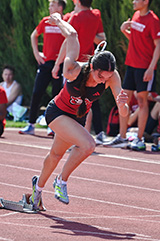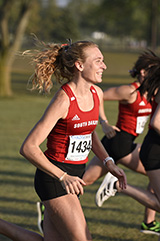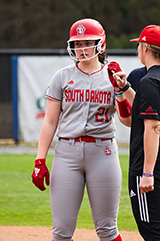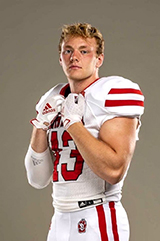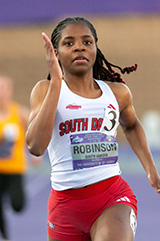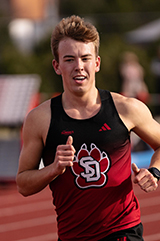A Passion for Health, A Passion for Athletics

It makes a lot of sense that many college students with athletic interests pursue careers in health care. A major in the health sciences and competing as a college athlete share many doctrines: competitiveness, discipline and leadership are just a few.
In a culture where many Division I athletic programs do not allow players to choose difficult and time-consuming majors, such as those in the health sciences, at the University of South Dakota, student-athletes are free to pursue any area of study they are passionate about.
Although the USD School of Health Sciences’ outstanding student-athletes face challenges with academic curriculum and extracurricular activity time management, they also exhibit determination, leadership, a high level of accomplishment and strong work ethic – and they find high levels of success in both academics and athletics without compromising either.
All college majors have rigors and demands; but the challenges of being a student-athlete are unique in scope. Tough curricula can lead to days overladen with studying, labs and clinicals, in addition to hours of physical workouts, team meetings and service activities. USD student-athletes can spend upward of 20 hours per week training for their sport.
According to health sciences faculty, student-athletes must be intrinsically motivated for success – highly organized, disciplined and good at prioritizing. “Our nursing student-athletes are organized and plan ahead,” said Helene Hegge, Vermillion site director for USD Nursing. “Their athletic training has helped their critical thinking and communication skills, which are needed for nursing as well. There is a competitive drive that assists in the student-athlete to stay focused on patient outcomes and quality care. Student-athletes are also coachable and accept feedback.”
The School of Health Sciences provides the resources student-athletes need, building on a tradition and history of helping all health sciences students achieve success. Faculty and staff support measures include things like individual meetings to identify make-up days for clinicals, labs, simulations and seminars when they need to be missed and check-ins throughout the semester to ensure commitments are being managed.
“We make ourselves available for extra teaching or lab time if our student-athletes miss class and we often track the outcomes, or even attend the events, if possible, to show our support,” explained Whitney Lucas-Molitor, Ph.D., OTD, chair of the Department of Physical Therapy.
“Once students are admitted into our program, we are committing to them, just as they are committing to us,” said Jed Droge, DPT, assistant professor of physical therapy. “We want to see them become successful physical therapists. The truth of the matter is that there are many different backgrounds in physical therapy. Athletics is certainly one of them, and if our support can help our students become long-term successful graduates of our program, it’s worth our time and effort to support them.”
We asked a few student-athletes in the School of Health Sciences how professors, advisors and staff have helped them be successful in all aspects of their collegiate careers.
Averi Schmeichel
Junior (academically) and senior (athletically)
Program: Nursing Sport: Track & Field
Hometown: Hartford, South Dakota
“The professors and other School of Heath Sciences support staff have been extremely helpful in my academic journey while competing in athletics. Professors and staff are constantly working with other athletes and myself to figure out schedules that allows us to be successful. Many times, professors are coming into the classroom early and staying late to allow us to make up activities that we may have missed due to our sports. The nursing school staff has been very understanding of my busy schedule, and they are always willing to help me find a plan!”
Abby Ripperda
‘24 Physical Therapist, Avera Fitness Center
Program: Doctor of Physical Therapy
Sport: Track & Field, Cross Country
Hometown: Sioux Falls, South Dakota
“Throughout my time at USD the professors and support staff set me up well to be successful both in my sport as well as the classroom. While completing my doctorate degree, I continued to participate in college athletics, and I felt that my professors were my biggest supporters and willing to be available to me outside of class time to make sure I continued to be successful in the physical therapy program, despite class and work time missed for competitions.”
Clara Edwards
Senior
Program: Nursing
Sport: Softball
Hometown: Clay Center, Kansas
“My professors work with my schedule and make sure I am getting the best learning experience possible. They are very supportive of both the academic and the athletic side of college.”
Jason Simon-Ressler
Graduate student, Class of 2025
Program: Master of Public Health
Sport: Football, 2019-2023
Hometown: Farley, Iowa
“I found an inviting School of Health Sciences staff once I began a minor in public health as an undergraduate. They encouraged my pursuit of public health. I appreciated having the School of Health Science staff as mentors who understood my passion for athletics and helped me align my career goals, ensuring I could pursue what I love once it was time to hang up the cleats.
I have found some fantastic opportunities post-graduation through internships, jobs and relationships that I built as a former athlete. A career in preventing disease and injury through the public health approach is something that I am happy to have such a strong start in, which is largely thanks to my education, mentors and background as a student-athlete.
Annalee Robinson
Senior Program: Nursing
Sport: Track & Field
Hometown: Clarendon, Jamaica
“The professors are aware of the workload that a collegiate athlete may experience, and they’ve done their best to help me and ensure that I stayed on track to be successful in this major. Being a college athlete can sometimes be time-consuming, primarily due to training hours and competition schedules. Fortunately, I have wonderful professors who work with me to organize other make-up times that work best with my schedule so that I can complete all my labs and clinicals. Not only that, if I need to leave school because of anything track-related, they’ll make sure to record lectures for anything that I will miss, and they’re always ready to address any questions or concerns I may have about areas I’ve missed. The professors played a crucial role in my academic success. I enjoy tough tasks, and my degree offers challenges that might be rewarding to achieve."
Luke Olson
Graduate student, Class of 2026
Program: Doctor of Physical Therapy
Sport: Track & Field
Hometown: Ely, Minnesota
“School of Health Sciences professors and support staff assist my academic success by offering flexible schedules, personalized office hours and a supportive environment that understands the demands of balancing sports and studies.”

